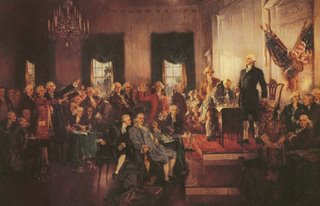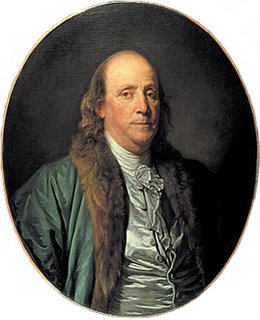 Isaac Kramnick and R. Laurence Moore have written a popular "textbook" entitled The Godless Constitution. It is based on the idea that America was founded by Secular Humanists, Deists and Agnostics, and not by people whose minds were shaped by the Reformation and scripture. So widely accepted is this idea that most people embrace this proposed mindset of our forefathers without question. Last Sunday, I posed the following question to my congregation: "Of the men who made up the founding generation, who was the most atheistic, agnostic and deistic?" Without hesitation, they answered, “Jefferson and Franklin.” Amazing!
Isaac Kramnick and R. Laurence Moore have written a popular "textbook" entitled The Godless Constitution. It is based on the idea that America was founded by Secular Humanists, Deists and Agnostics, and not by people whose minds were shaped by the Reformation and scripture. So widely accepted is this idea that most people embrace this proposed mindset of our forefathers without question. Last Sunday, I posed the following question to my congregation: "Of the men who made up the founding generation, who was the most atheistic, agnostic and deistic?" Without hesitation, they answered, “Jefferson and Franklin.” Amazing!I am not declaring that Ben Franklin or Thomas Jefferson were Evangelical Christians by modern definition. However, I will assert that upon reading their words, there are obvious indications that these two minds were shaped by the Reformation as profoundly as any peer in the founding generation. Like Jefferson, Franklin struggled with organized religion. Yet while his very own words indicate an influence from the Enlightenment, their foundation was based on the Reformation.
On June 28, 1787, as the Constitutional Convention was locked in a power struggle over how large and small states would share this national government, a dark cloud covered the proceedings. Franklin, the elder statesmen rose to his feet and read from a paper he had been writing on most of the day. His words revealed a man convinced not that human reason would prevail, but as he put it, "...our different sentiments on almost every question, several of the last producing as many noes as ays, is methinks a melancholy proof of the imperfection of the Human Understanding." What he requested from the fifty-five delegates was that they should pray.
"In the beginning of the Contest with Great Britain, when we were sensible of danger we had daily prayer in this room for the Divine protection. Our prayers, Sir, were heard, and they were graciously answered. All of us who were engaged in the struggle must have observed frequent instances of a superintending providence in our favor.
To that kind providence we owe this happy opportunity of consulting in peace on means of establishing our future national felicity. And have we now forgotten that powerful Friend? Or do we imagine we no longer need His assistance?
I have lived, Sir, a long time, and the longer I live, the more convincing proofs I see of this truth-that God governs in the affairs of men. And if a sparrow cannot fall to the ground without His notice, is it probable that an empire can rise without His aid?
We have been assured, Sir, in the Sacred Writings, that 'except the Lord build the House, they labor in vain that build it.' I firmly believe this; and I also believe that without His concurring aid we shall succeed in this political building no better than the builders of Babel.
I therefore beg leave to move-that henceforth prayers imploring the assistance of Heaven, and its blessing on our deliberations, be held in this Assembly every morning."

If Benjamin Franklin was a Deist, this call to prayer of our founding generation was a serious lapse in his theology. His clear statement that "God governs in the affairs of men," is deistic heresy. Maybe, just maybe, history is a little more complex than some would have us believe. Maybe Mr. Franklin deserves closer reevaluation.
The minds that gave us such an amazing document as the U.S. Constitution were more profoundly shaped by scripture than the Enlightenment. Today, some point out that our Constitution never references God or Jesus Christ. While this is true, this point is an undeniable oversimplification. The Bible itself does not spend much time defending the existence of God. It simply says that fools deny His existence. In the founders way of thinking, some ideas are "self-evident." It is possible that like those who wrote the Bible, the founding generation never dreamed that there would be a time when foolish men would be so bold as to openly deny the very God who they were convinced governs in the affairs of men and without whom we would not exist as free people.
Ed Litton
No comments:
Post a Comment